SmArts
March 27 - April 2, 2017
The conversation
By Molly Rector
This week the reading series I run, Open Mouth, hosted a series of events with another organization – The Conversation Literary Festival. The Conversation is an organization founded by two poets, Nabila Lovelace and Aziza Barnes, with the mission of hosting readings, craft talks, and workshops all focused on what it means to create productive spaces for artists of color in the American south. The Conversation events were made possible through the generous support of various offices of the University of Arkansas, including the Creative Writing program, the Honors College, the Multicultural Center, and the Office of Diversity.
On Monday, Lovelace and Barnes hosted a workshop at Fayetteville’s Nightbird Books during which participants gathered around a table to discuss the creation of a “personal mecca” (or haven) within one’s own writing – that is, the process of journeying toward a writing that gives the writer a sense of peace, a sense of having made work that feels true and real.
The workshop opened with an exercise in which participants were asked to write freely, but occasionally Barnes would say “I don’t believe you” and then participants were supposed to change the narrative or image they were writing. The goal was to expose the creative leaps we can make when asked to move quickly between one mode of thinking and another.
On Tuesday, we held a reading during which Lovelace and Barnes, along with conversation fellows Jeremy Michael Clark and A. H. Jerriod Avant, alternated sharing poems and then discussing how their work engages in what they call mecca creation – how poetry allows them, as artists of color, to celebrate their voices (and each others’) in a world that often seeks to silence them.
After each round of poems, a discussion ensued that both flowed from and moved into the theme for the next round of poems – so rather than simply a reading, a showing-off of work (not to put readings down, I love them), it became a sort of tutelage in the dialogue between personal/political experience and the making of art: a model for the way these things weave together in our lives.
Witnessing the conversation between these four poets was, simply, beautiful. They sat, living-room style in front of an audience of 40 or so strangers, and talked about intimate and painful experiences, openly celebrating one another’s work with a kind of bright and living joy I have to believe is the point of the whole exercise of art. I believe that witnessing true dialogue – the kind that evolves and moves forward with new premises as the conversation builds – is essential in a moment when many Americans seem to feel we have to know everything before we begin talking. May we all seek that kind of openness in our exchanges with one another.
Molly Rector is a staff writer for the Daily Record. Contact her at mrector@gm.slc.edu.



